“First day in Medical School they get a stack of books and a dead human being. That, I’m afraid, would change you” does anyone remember this line from the TV show The Mentalist? Well, it’s true that studying medicine and stress go together. Everything from the humongous syllabus to handling patients in the hospital, in addition to the pressure from parents & professors and let’s not forget the RAGGING. All of these things in just the first few months, it’s nothing short of overwhelming.
Most medical students who are around 17-18 years of age, go through some of the most competitive entrance exams to get into medical school. A lot of them stay away from home and live in residential facilities of their college, which to put it politely are “sub-par”. Did I mention the examination process during college; the voluminous syllabus, theory exams with high passing marks, along with practical exams which go on for an entire day or sometimes longer in my experience. These exams consist of at least 4 viva voce sessions usually dealing with actual microscope slides, organs, bones & sometimes real people. I can’t think of any other course outside of medicine that has such a strenuous examination process. Hence, it has become vital for medical students to develop healthy coping mechanisms, especially in the present situation, with the additional strain on the medical community. For budding doctors to avoid burnout and stress, they need to be provided with the right guidance & support.
Stress
DAY TO DAY
Classes & postings
Let’s dive into what causes the stress; the classes where one is exposed to a humongous amount of information, which trust me can be a pain to sort out later. Next, we move on to either the dissection hall or to clinical postings depending upon which year they are in and here they face a barrage of questions from any corner of the book (if they have figured out which book and author to read from); irrespective of whether it has been covered in previous lectures or not, by not only professors but sometimes residents as well. In addition to practising their clinical skills, only if the patient feels like it of course.

Mental pressure
In the midst of all this at some point, they will have a break (if the unit in charge allows it), which is often spent writing records, and followed by more classes or labs. Now, if the students have made it this far, they can happily exit the building with some time to socialize & vent; unless they are in their first year, then they have to watch out for groups of idle seniors looking for their next prey. It doesn’t end here, if you are a medical student you have to face pressure from parents, extended family or even from themselves to get distinctions, gold medals or even about entrances into residency programs; to get everything absolutely right! Imagining that, you have started to scratch the surface of what it feels like to be a medical student.
Prevalence of mental illness among medical students
Medical students go through a very high depression & anxiety, though fifth-semester students having the highest stress scores among medical students, however, the prevalence of stress among 1st-year students was found to be around 91.1%. Erratic sleep schedules go hand in hand with medicine students.
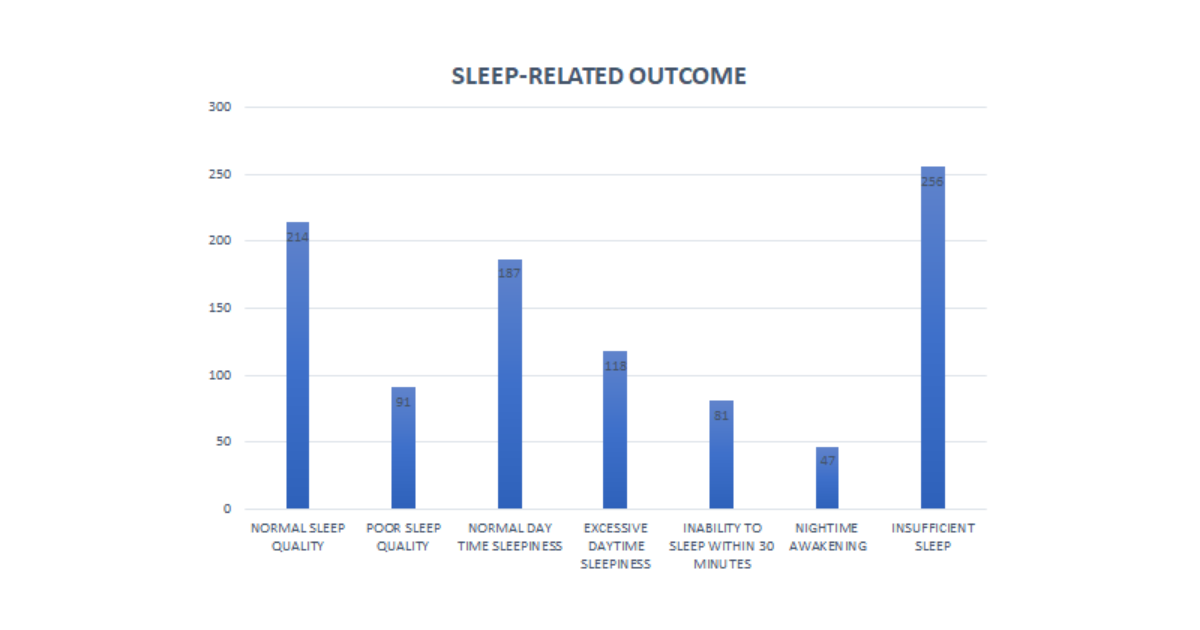
During Covid-19
After years of writing tests, slogging, surviving the academic and management pressure comes the time to enter clinical postings and all of a sudden the pandemic showed its prevalence.
Cessation of clinical postings
Medical students are proven to be at a higher risk of developing mental health disorders during their training period. With the added stressors related to the pandemic, the abrupt cessation of clinical postings for medical students will expose them & their family members to risk if they do decide to participate in clinical postings. These circumstances have placed the medical students in a real catch-22 situation. The decreased interaction with their peers will pose difficulty for those students who had higher levels of depression, anxiety, and stress, to begin with, leading to exacerbation of symptoms
Online classes
Amid all this chaos, online classes have played a big role in controlling their anxiety symptoms due to being distant from the perceived risk of COVID-19. One study revealed that 87% of students perceived less income knowledge from online classes and over half of the students were totally satisfied with it, and in another study, anxiety levels significantly decreased and knowledge score stopped being a predictor for medical students’ anxiety after switching to the online learning, in contrast with their non-medical peers. Another reason for this could be that minimization of medical students’ presence in hospitals.
Exacerbation of mental illnesses during COVID-19
According to some studies, 35.5% of the undergraduate medical students, including residents & interns showed symptoms of depression, anxiety, and stress respectively during COVID-19 outbreak with the majority with moderate depression (15.2%), moderate anxiety (17.5%), and mild stress (13.4%). Findings show that poor sleep quality is both a cause and an effect of increased depression, anxiety, and stress symptoms in medical students during this pandemic. Thus, worsening of one could exacerbate the other.
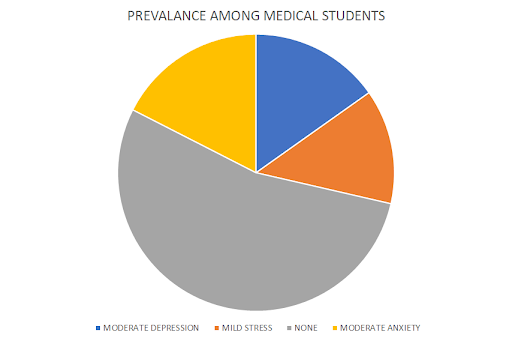
About The Future
NEED FOR PSYCHOLOGICAL SUPPORT
Necessity
There is nothing new about hardships for Doctors and Medical students, this year being one of the toughest for the medical fraternity. Nonetheless, in order to have long thriving careers, it is crucial for students to learn the importance of support systems like friends and family to rely upon and develop coping mechanisms to help buffer the various stressors & prevent burn out.
Coping mechanisms employed
According to surveys done among Asian medical students, there is a complex relationship between the various stressors and the coping strategies employed by students; which include
- Positive reframing,
- Planning,
- Acceptance,
- Active coping,
- Self-distraction,
- Emotional support,
- Humour
- Religion, whereas on the other end of the spectrum; negative Coping Styles
- like Blame, and Substance Use.
Responsibility of medical institutions
There is a need for medical institutions to show more initiative, to aid their students as they go through drastic changes at a vulnerable stage in their lives.
- The students should be taught different stress management techniques to improve their ability to cope with a demanding professional course.
- The living conditions of the students and their recreational facilities should be improved.
- There is also a need to bring about changes in the quality of teaching and evaluation system.

- Accustom the medical students to have healthy expectations & avoid perfectionism (factors like self-expectation and expectation from their significant ‘others’ may influence students’ perception of their marks).Hence, the contents, teaching ,learning methods and the evaluation process needs to be analysed and improved.
- Providing an exam schedule at the beginning of the year.
- Encouraging cooperation instead of competition
- There should be a psychologist exclusively for this group who could foster healthy interpersonal relationships with the student, and, thereby, be in a position to nurture their potentials, as well as see them through the stressful periods.
- There should also be frequent workshops on enhancing coping techniques.
- Since all the behaviour and responses pass through the filter of personality, there should also be programs which help the student to identify strengths and weaknesses in his/her personality, and make changes accordingly.

Opportunity For Personal Growth
For anyone, this can be a discombobulating time; when it is incredibly difficult to learn, with all of our plans in a state of disarray. It can be a good time to take our blinders off & try to look at other things. Your mind could be scrambling for things to do during this phase & it might be a good time to expand “what defines you”, to slow down and re-evaluate your priorities.
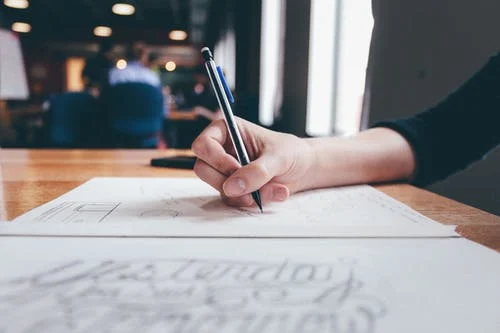
If you are a medical student, doctor or in any intense field it only gets tougher, not easier. Now, this is not one of those toughen up & push through speeches. In our journey to heal & help other people or should I say in our rush; there are some things we should internalize. First, the work we do is good work, but it is also a difficult work. Not that this should stop us, but it is worth the acknowledgement. Second, the empathy we show to others, learn to show some of it to ourselves. Third, to pay attention to the intricacies of our own mind; our values, the things that excite us, what makes us special, how we like to spend our time, what we want & how much we are willing to put up with to get it; with the same attention we pay to our books. Fourth, especially for anyone in the medical field It is important to learn to heal our patients however, it is also equally important to learn to heal ourselves as well. Finally, it is okay to ask for help, whether it be from our loved ones, our classmates, or from our institutions.
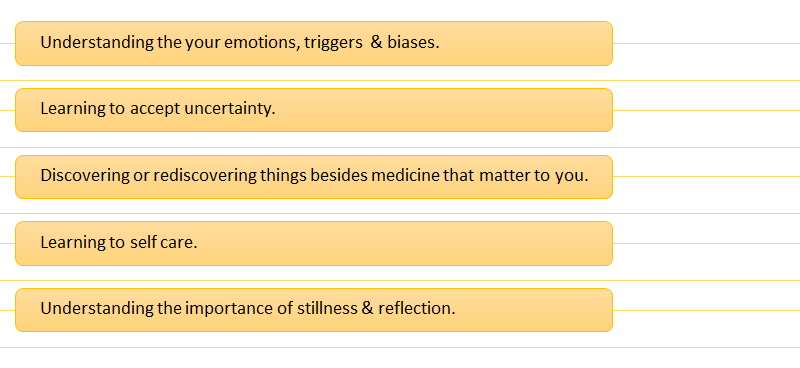
“Composed by: Dr.Siddhanth Rangineni is an intern in a medical college. He is interested in psychiatry as a specialization & enjoys writing.”

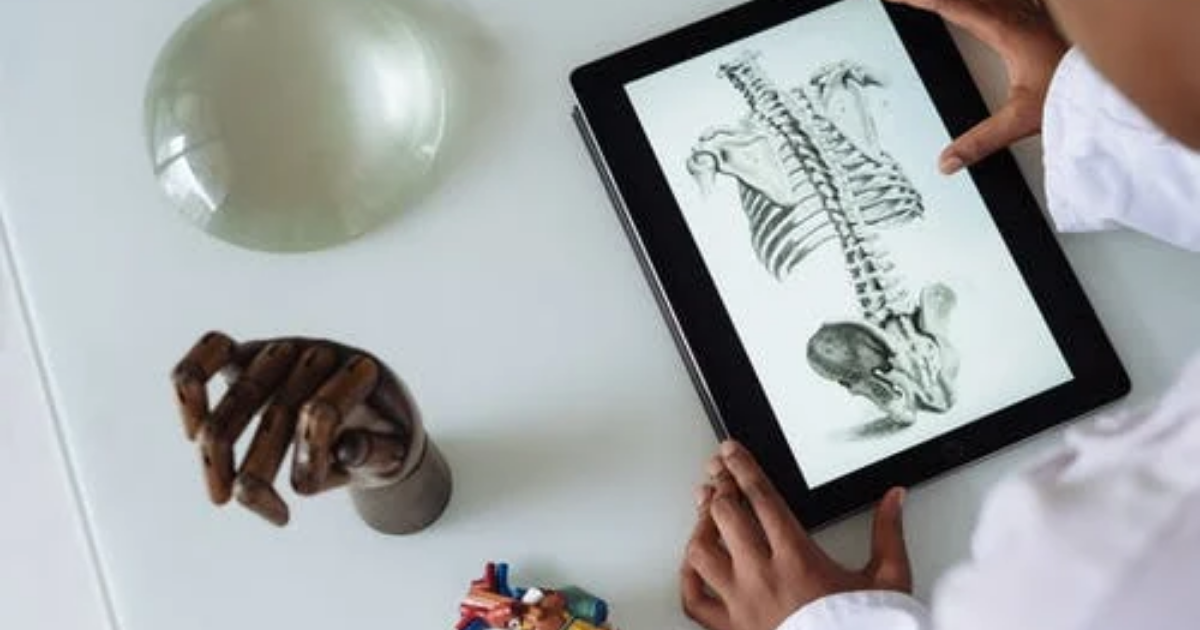
Very informative article! Thoroughly enjoyed reading it.
Well explained about the stress of Medical and other fields as well.
And how to over come.
Thoughtful message
Uplifting, thoughtful and empathetic.
Key points made about self-analysis and acceptance are crucial for maintaining a positive mindset
I wholeheartedly agree with the points mentioned in this article, the current pandemic and home isolation are bringing a new Frontier in terms of mental illnesses and the effect it has on the psyche.
The steps to combat this problem are also well written
I liked the part where u mentioned about perfectionism and your emphasis on mental health is something really creditable . Couldn’t agree more about the schedule for exams to be given right at the beginning of the year . All in all love the article. Great job on the paraphrasing as well.